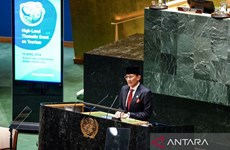US Assistant Secretary stresses importance of Asia to US
US Assistant Secretary Daniel Russel responsible for East Asia and the
Pacific has affirmed the importance of Asia to America as well as the
region’s stability in the US interest.
US Assistant Secretary Daniel Russel responsible for East Asia and the
Pacific has affirmed the importance of Asia to America as well as the
region’s stability in the US interest.
“Asia matters to the entire United States – to our economy, to our security, to our families,” Russel said in his speech at the Commonwealth Club in San Francisco, California, on July 28.
According to the official, that’s why President Obama decided, before he even took office, to institute a long-term, strategic emphasis on the region.
He said he is confident “that strategy will extend far beyond his presidency, because we have strong bipartisan support for it – both parties understand the importance of Asia.”
In his speech, Russel stressed Southeast Asia as the dynamic centre of the region, and the ten countries that make up the Association of Southeast Asian Nations (ASEAN).
These ten countries have many differences, but they are bound by the conviction that they can achieve more together than they can apart, he said.
“The region’s economic dynamism and strategic importance has made it a particular focus of this administration – the ‘rebalance within the rebalance,’ if you will,” he affirmed.
“ASEAN matters to the entire United States,” he emphasised, adding ASEAN is the US’s fourth-largest export market and trading partner.
“Sitting astride vital trade routes, it is important to our security,” he added.
A stable Southeast Asia that meets the aspirations of its people is in America’s national interest, the US official affirmed.
He said that President Obama and Secretary Kerry will be in Myanmar in November to attend ASEAN meetings.
Regarding the East Sea, Russel stressed peace and stability in the East Sea is important to the international community, because the East Sea is essential to the global economy. Up to 50 percent of the world’s oil tanker shipments, and over half of the world’s merchant tonnage, pass through the East Sea.
In recent months, the main security challenge facing ASEAN has been tensions in the East Sea, he said, adding the national interests like freedom of navigation, international law, the peaceful settlement of disputes, and unimpeded commerce are at stake.
Russel said the US works to lower tensions and help the parties peacefully manage their disputes in several ways, and calls on all sides to avoid provocations and make clear claims based on international law.
“We are urging China and other parties concerned to have a conversation about what activities are acceptable to each of them – both to help reduce tensions now, and manage differences in the long run,” he said.
In 2002, the ASEAN nations and China signed a Declaration on Conduct in the East Sea. The Declaration, among other things, said that the parties would resolve disputes peacefully and in accordance with international law, and would refrain from actions that would escalate disputes, such as setting up new outposts on unoccupied features. They agreed to work toward a more detailed Code of Conduct.
“Big and powerful countries have a special responsibility to show restraint,” he stressed, adding international law, not national power, should be the basis for pursuing maritime claims in the East Sea.
“Asia matters to the entire United States – to our economy, to our security, to our families,” Russel said in his speech at the Commonwealth Club in San Francisco, California, on July 28.
According to the official, that’s why President Obama decided, before he even took office, to institute a long-term, strategic emphasis on the region.
He said he is confident “that strategy will extend far beyond his presidency, because we have strong bipartisan support for it – both parties understand the importance of Asia.”
In his speech, Russel stressed Southeast Asia as the dynamic centre of the region, and the ten countries that make up the Association of Southeast Asian Nations (ASEAN).
These ten countries have many differences, but they are bound by the conviction that they can achieve more together than they can apart, he said.
“The region’s economic dynamism and strategic importance has made it a particular focus of this administration – the ‘rebalance within the rebalance,’ if you will,” he affirmed.
“ASEAN matters to the entire United States,” he emphasised, adding ASEAN is the US’s fourth-largest export market and trading partner.
“Sitting astride vital trade routes, it is important to our security,” he added.
A stable Southeast Asia that meets the aspirations of its people is in America’s national interest, the US official affirmed.
He said that President Obama and Secretary Kerry will be in Myanmar in November to attend ASEAN meetings.
Regarding the East Sea, Russel stressed peace and stability in the East Sea is important to the international community, because the East Sea is essential to the global economy. Up to 50 percent of the world’s oil tanker shipments, and over half of the world’s merchant tonnage, pass through the East Sea.
In recent months, the main security challenge facing ASEAN has been tensions in the East Sea, he said, adding the national interests like freedom of navigation, international law, the peaceful settlement of disputes, and unimpeded commerce are at stake.
Russel said the US works to lower tensions and help the parties peacefully manage their disputes in several ways, and calls on all sides to avoid provocations and make clear claims based on international law.
“We are urging China and other parties concerned to have a conversation about what activities are acceptable to each of them – both to help reduce tensions now, and manage differences in the long run,” he said.
In 2002, the ASEAN nations and China signed a Declaration on Conduct in the East Sea. The Declaration, among other things, said that the parties would resolve disputes peacefully and in accordance with international law, and would refrain from actions that would escalate disputes, such as setting up new outposts on unoccupied features. They agreed to work toward a more detailed Code of Conduct.
“Big and powerful countries have a special responsibility to show restraint,” he stressed, adding international law, not national power, should be the basis for pursuing maritime claims in the East Sea.












